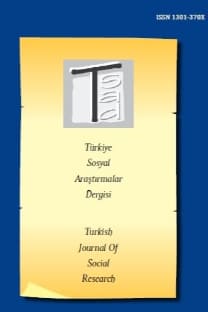ÖĞRETMEN ADAYLARININ ÇEVRE KONULARINA YÖNELİK TUTUMLARININ BAZI DEĞİŞKENLERE GÖRE İNCELENMESİ
RESEARCH ON THE ATTİTUDES OF TEACHER CANDIDATES TOWARDS ENVIRONMENTAL ISSUES IN TERMS OF CERTAIN VARIABLES
___
- Atasoy, E. (2015). İnsan-Doğa etkileşimi ve çevre için eğitim. Bursa: Sentez Yayıncılık.
- Cutter-Mackenzie, A. ve Edwards, S. (2006). Everyday environmental education experiences: the role of content in early childhood education. Australian Journal of Environmental Education, 22(2), 13-19. https://doi.org/10.1017/S0814062600001348
- Demirbaş, M. ve Pektaş, H. M. (2009). İlköğretim öğrencilerinin çevre sorunu ile ilişkili temel kavramları gerçekleştirme düzeyleri. Necatibey Eğitim Fakültesi Elektronik Fen ve Matematik Eğitimi Dergisi (EFMED), 3(2), 195-211.
- Demirtaş, Z., Ekşioğlu, S. ve Söylemez, H. (2018). Environmental education in formal education and lifelong learning according to teachers’ views, International Journal of Eurasia Social Sciences, 9(31), 767-791.
- Diken, E. H. ve Sert Çıbık, A. (2009). İlköğretim bölümü öğretmen adaylarının çevre bilincinin cinsiyete göre değişiminin incelenmesi, Bayburt Üniversitesi Eğitim Fakültesi Dergisi, 4,(I-II), 14-25.
- Erten, S. (2005). Okul öncesi öğretmen adaylarında çevre dostu davranışların araştırılması. Hacettepe Üniversitesi Eğitim Fakültesi Dergisi, (28), 91-100.
- Hook, P. (2015). Çevre terimlerinin küçük kitabı. (Çev. B. Kurt). Ankara: Tübitak.
- Karademir, E. (2016). Eğitim fakültelerinin yapılandırılması sürecinde öğretmen adaylarının çevre bilinci ve özyeterliklerinin belirlenmesi. Eğitim ve İnsani Bilimler Dergisi: Teori ve Uygulama, 7(13), 3-18.
- Kışoğlu, M., Yıldırım, T., Salman, M. ve Sülün, A. (2016). İlkokul ve ortaokullarda çevre eğitimi verecek olan öğretmen adaylarında çevre sorunlarına yönelik davranışların araştırılması. Erzincan Üniversitesi Eğitim Fakültesi Dergisi, 18(1), 299-318. https://doi.org/10.17556/jef.93507
- MEB. (2013). Okul öncesi eğitim programı. Ankara: Talim ve Terbiye Kurulu Başkanlığı.
- Önder, A. ve Özkan, B. (2013). Sürdürülebilir çocuk gelişimi, okul öncesinde etkinliklerle çevre eğitimi. Ankara: Anı Yayıncılık.
- Öz Aydın, S., Şahin, S. ve Korkmaz, T. (2013). İlköğretim fen bilgisi, sınıf ve okul öncesi öğretmen adaylarının çevresel tutum düzeylerinin belirlenmesi ve karşılaştırılması. Necatibey Eğitim Fakültesi Elektronik Fen ve Matematik Eğitimi Dergisi (EFMED), 7 (2), 248-267.
- Özey, R. (2009). Çevre sorunları (3. Baskı). İstanbul: Aktif Yayınevi.
- Öztürk, T. ve Öztürk, F. Z. (2015). Öğretmen adaylarının çevre ve çevre eğitimi ile ilgili görüşleri (Ordu üniversitesi örneği). Balıkesir Üniversitesi Sosyal Bilimler Enstitüsü Dergisi, 18(33), 115-132.
- Sadık, F. (2013). Öğretmen adaylarının çevresel tutum ve bilgi düzeylerinin çeşitli değişkenler açısından incelenmesi. Pegem Eğitim ve Öğretim Dergisi, 3(4), 69-82. https://doi.org/10.14527/C3S4M5
- Saraç, E. ve Kan, A. (2015). Öğretmen adayları için çevre konularına yönelik tutum ölçeği geliştirme geçerlik ve güvenirlik çalışması. Eğitim ve Öğretim Araştırmaları Dergisi, 4 (2), 14.
- Sarıgöz, O., Dönger, A. ve Cengiz, M. Ş. (2015). Öğretmenlerin çevre eğitimi ve çevre sorunları hakkındaki görüşlerinin değerlendirilmesi. Uluslararası Hakemli Beşeri ve Akademik Bilimler Dergisi, 4(14), 54-76.
- Shek, M. (2013). Hong kong school guidance and counselling service: development and approach. Luk-Fong P. ve Lee-Man Y. (Eds.), School guidance and counselling: trends and practices (pp. 55-76). Hong Kong University Press.
- Şahin, S. H., Ünlü, E. ve Ünlü, S. (2016). Öğretmen adaylarının çevre okuryazarlık farkındalık düzeylerinin incelenmesi. Education Sciences (NWSAES), 11(2), 82-95.
- Türkoğlu, A ve Şahin, Ü. (2013). Öğretmen adaylarının çevre sorunlarının nedenlerine, çözümlerine ve çevre eğitimine ilişkin görüşleri. Ankara Üniversitesi Eğitim Bilimleri Fakültesi Dergisi, 46(2), 179-193. https://doi.org/10.1501/Egifak_0000001300
- Uyanık, G. (2016). Öğretmen adaylarının çevre sorunlarına ilişkin bilgi düzeylerinin ve tutumlarının incelenmesi. Online Fen Eğitimi Dergisi, 1(1), 30-41.
- Yavuz, M., Balkan Kıyıcı, F. ve Atabek Yiğit, E. (2014). İlköğretim II. kademe öğrencileri için çevre okuryazarlığı ölçeği: ölçek geliştirme ve güvenirlik çalışması. Sakarya University Journal of Education, 4(3), 40-53. https://doi.org/10.19126/suje.42950
- ISSN: 1301-370X
- Yayın Aralığı: 3
- Başlangıç: 2015
- Yayıncı: AKADEMİSYENLER BİRLİĞİ DERNEĞİ
2012-2018 YILLARI ARASINDA KPSS LİSANS GENEL KÜLTÜR TESTİ COĞRAFYA SORU DAĞILIMLARININ İNCELENMESİ
ORTAÖĞRETİM MATEMATİK DERSİ ÖĞRETİM PROGRAMININ ÖĞRETMEN GÖRÜŞLERİNE GÖRE DEĞERLENDİRİLMESİ
KPSS COĞRAFYA ÖĞRETMENLİK ALAN BİLGİSİ TESTİ(ÖABT) SORU DAĞILIMLARININ İNCELENMESİ
ÖĞRETMEN ADAYLARININ ÇEVRE KONULARINA YÖNELİK TUTUMLARININ BAZI DEĞİŞKENLERE GÖRE İNCELENMESİ
Ahmet Turan ORHAN, İlham� ARSEVEN
DÜNYA MİRASI KÜLTÜREL ROTALAR KAPSAMINDA TÜRKİYE’DEKİ GELİŞİM KORİDORLARININ DEĞERLENDİRİLMESİ
Nevin TURGUT GÜLTEKİN, Tuğçe Nida Nur ÇETİN
TÜRKİYE’DE ÖĞRETMENLİK MESLEĞİNE YÖNELİK TUTUM İLE İLGİLİ YAPILAN MAKALELERİN İNCELENMESİ
